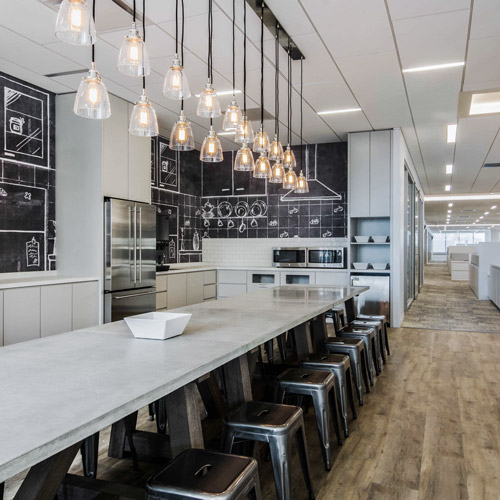When Planet Fitness went public in August 2015, its franchisees had opened more than 1,000 locations across the country with plans to add at least 1,000 more to their roster. The company had also recently crossed the northern border, successfully opening two locations in Canada. All the while, CEO Chris Rondeau avoided raising the club’s appealing $10-per-month membership fee to continue exposing first-time and casual gym goers to its “Judgment Free Zone” and creating a welcoming, fit community.
A year later, the company’s more than 180 franchisees continue to take the brand to new heights, including a recent opening in the Dominican Republic. Much of that enthusiasm can be attributed to Josh Beyer, Planet Fitness’ vice president of real estate and development, who is responsible both for motivating franchisees and exposing them to the most lucrative avenues for success.
Beyer came to Planet Fitness through Brian Belmont, the current executive vice president of franchise operations and development. The two met while working at Quiznos, where Beyer moved through the ranks of the operations department and shifted to more profitable opportunities in development. While the money was there, Belmont taught him an essential philosophy that Beyer says he continues to follow to this very day.
“You’ll hear me say it all the time, but there is a difference between smart growth and rapid growth,” Beyer tells American Builders Quarterly. “While smart growth can take a market to its highest potential, rapid growth can oversaturate the market.”

As Planet Fitness expands its reach, it faces new competition and seeks new solutions. Smart growth plays an essential role in its continued development. Beyer’s experience helped Planet Fitness open locations that have numerous marketing advantages. It also provided a new definition of a successful fitness club.
Although Quiznos was more of a development-oriented company that has thousands of franchisees, Beyer prefers Planet Fitness’ tightly run ship, packed with strong relationships and thriving brand.
“Ninety percent of our franchise openings over the past two years have been led by existing owners,” he says. “That tells me two things: the brand and franchise are doing very well, and the brand is very powerful because they only want to continue to buy more territory and become more involved with the brand.”
Beyer can relate to that excitement. He claims to have been infected by Rondeau’s passion and story when he visited Planet Fitness’ corporate office for the first time. When Belmont initially contacted him, he was comfortable working in non-traditional development at the UPS Store and living with his family in Philadelphia. Nevertheless, he did some due diligence and reached out to Planet Fitness franchisees to see if there was any negative feedback to neutralize his curiosity. After making 20 contacts, he says, “the only complaint they had about the brand was that they couldn’t open clubs fast enough.” It swayed him to move to New Hampshire.
When Beyer started his position, he faced some interesting challenges almost immediately and provided solutions informed by his development and real estate experience.
“When we were the only low-cost option in the market, we were able to go in the back side of an industrial plaza, three levels below ground—with no visibility whatsoever—and people were still able to find us,” he says. “With the change in competition and real estate, we’ve had to shift our thinking in terms of what makes a great site. We need to be in the best real estate in the area.”
To Beyer, Planet Fitness locations must have great access and visibility, plenty of parking, and cotenants that have similar customer bases. The company works mostly with grocery-anchored partners, such as Dollar Tree and Walmart, but it’s also struck successful partnerships with the likes of Staples and Modell’s Sporting Goods. Beyer relies on research done by their real estate analytics partner, which contributes information related to where the company’s members live, shop, and work.
The reflection of this new mentality can be found in Boston’s financial district, where a new, three-story Planet Fitness exceeded expectations thanks to heavy daytime traffic. The fitness center is located in the middle of most visitors’ workplaces, even though their homes are up to 20 miles outside of the city. This results in consistent traffic without the peaks and valleys that the company’s suburban locations face. The convenience encourages them to work out before or after work—or maybe slip in for a quick workout for their lunch’s main course.
“That was something we never took into our calculations before,” Beyer says.
Beyer and his team are excited to add that kind of asset to their future endeavors, perhaps more in the Dominican Republic. The first Planet Fitness opened there in November 2015, and the results have been encouraging.
“The guests of the club in the Dominican Republic have been so excited about us,” he says. “I think that works as a testament to our international strategy and the ability to capitalize on new market opportunities where the health concept will be well received.”
As Planet Fitness expands its borders, Beyer says he needs to be an effective motivator to keep the company’s energy high. He seeks to do so by encouraging his corporate team to be essential players to their franchisees and also establish a healthy work/life balance. As a father of two, Beyer prioritizes being a part of his kids’ activities, and he wants his coworkers to share in that kind of communal spirit, ensuring the company’s continued success is truly a shared experience.


